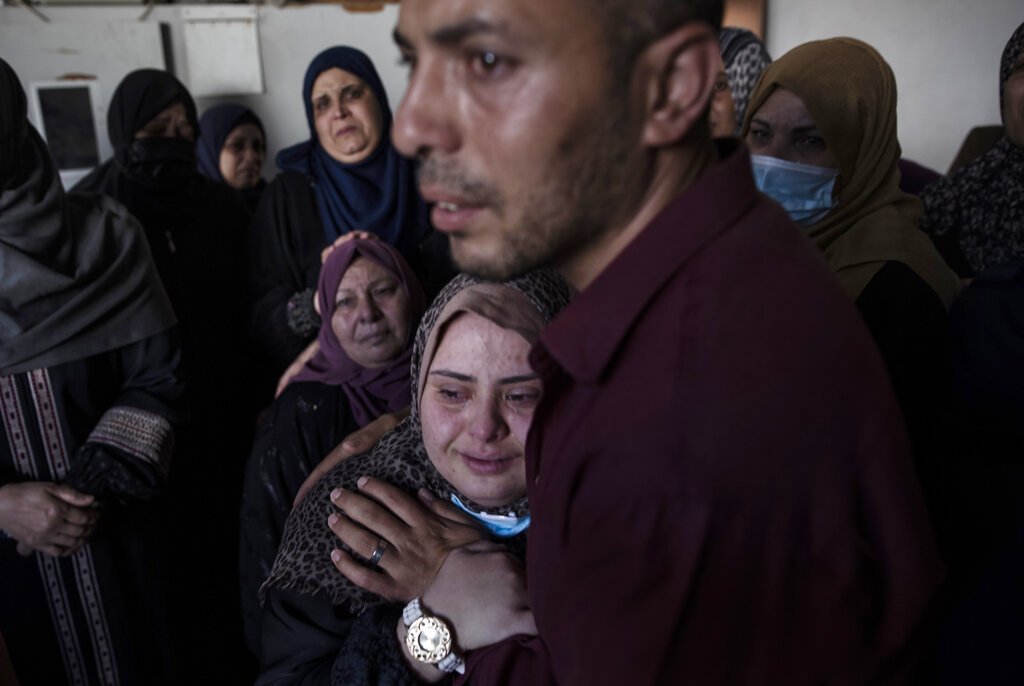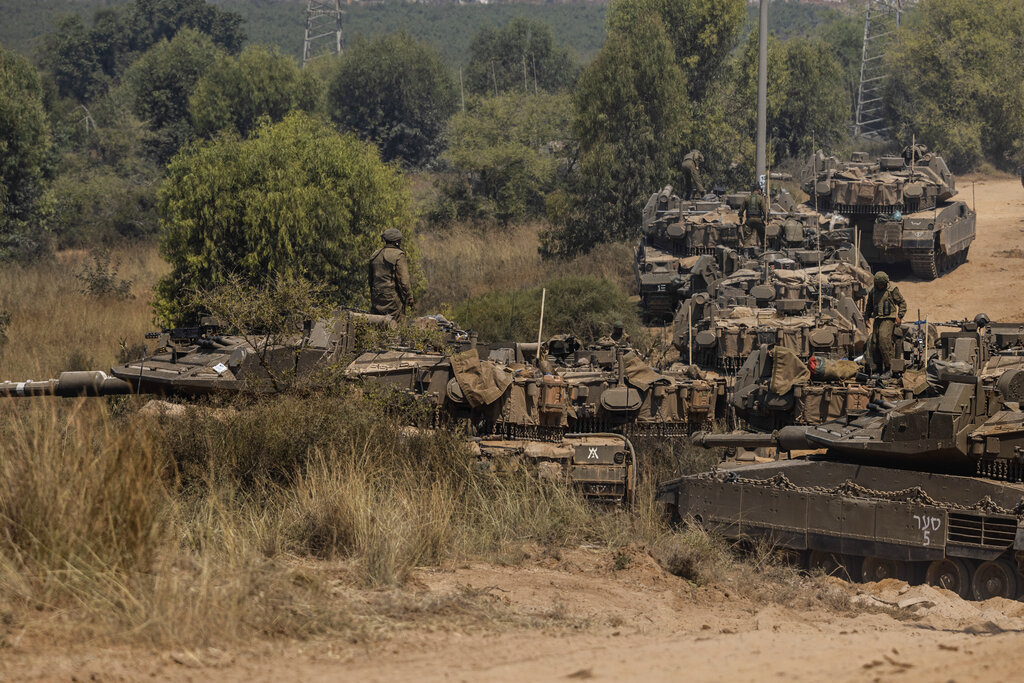GAZA CITY, Gaza Strip (AP) — Thousands of Palestinians grabbed children and belongings and fled their homes Friday as Israel barraged the northern Gaza Strip with tank fire and airstrikes, killing a family of six in their house and heavily damaging other neighborhoods in what it said was an operation to clear militant tunnels.
As international efforts at a cease-fire stepped up, Israel appeared to be looking to inflict intensified damage on the Islamic militant group Hamas, which controls the Gaza Strip and has fired hundreds of rockets into Israel.
The Gaza violence increasingly spilled over into turmoil elsewhere.
Across the West Bank, Palestinians held their most widespread protests since 2017, with hundreds in at least nine towns burning tires and throwing stones at Israeli troops. Soldiers opening fire killed six, according to Palestinian health officials, while a seventh Palestinian was killed as he tried to stab an Israeli soldier.
Within Israel, communal violence erupted for a fourth night. Jewish and Arab mobs clashed in the flashpoint town of Lod, even after additional security forces were deployed.


In Gaza, the toll from the fighting rose to 122 killed, including 31 children and 20 women, with 900 wounded, according to the Health Ministry. The Hamas and Islamic Jihad militant groups have confirmed 20 deaths in their ranks, though Israel says that number is much higher. Seven people have been killed in Israel, including a 6-year-old boy and a soldier.
Israel called up 9,000 reservists Thursday to join its troops massed at the Gaza border, and an army spokesman spoke of a possible ground assault into the densely populated territory, though he gave no timetable. A day later, there was no sign of an incursion.
But before dawn Friday, tanks deployed on the border and warplanes carried out an intense barrage on the northern end of the Gaza Strip.

Houda Ouda said she and her extended family ran frantically into their home in the town of Beit Hanoun, seeking safety as the earth shook for two and half hours in the darkness.
“We even did not dare to look from the window to know what is being hit,” she said. When daylight came, she saw the swath of destruction: streets cratered, buildings crushed or with facades blown off, an olive tree burned bare, dust covering everything.
Rafat Tanani, his pregnant wife and four children, aged 7 and under, were killed after an Israeli warplane reduced their four-story apartment building to rubble in the neighboring town of Beit Lahia, residents said. Four strikes hit the building at 11 p.m., just before the family went to sleep, Rafat’s brother Fadi said. The building’s owner and his wife also were killed.
“It was a massacre,” said Sadallah Tanani, another relative. “My feelings are indescribable.”
Lt. Col. Jonathan Conricus, an Israeli military spokesman, said the operation involved tank fire and airstrikes, aimed at destroying a tunnel network beneath Gaza City that the military refers to as “the Metro,” used by militants to evade surveillance and airstrikes.
“As always, the aim is to strike military targets and to minimize collateral damage and civilian casualties,” he said. “Unlike our very elaborate efforts to clear civilian areas before we strike high-rise or large buildings inside Gaza, that wasn’t feasible this time.”
When the sun rose, residents streamed out of the area in pickup trucks, on donkeys and on foot, taking pillows, blankets, pots and pans and bread. “We were terrified for our children, who were screaming and shaking,” said Hedaia Maarouf, who fled with her extended family of 19 people, including 13 children.
Adnan Abu Hasna, a spokesman for UNRWA, said thousands broke into 16 schools run by the relief agency, which he said was scrambling to find a way to shelter them, given movement restrictions on its staff amid the fighting and COVID-19 worries.
Mohammed Ghabayen, who took refuge in a school with his family, said his children had eaten nothing since the day before, and they had no mattresses to sleep on. “And this is in the shadow of the coronavirus crisis,” he said. “We don’t know whether to take precautions for the coronavirus or the rockets or what to do exactly.
Hamas showed no signs of backing down. So far, it has fired some 1,800 rockets toward Israel, some targeting the seaside metropolis of Tel Aviv, although more than a quarter of them have fallen short inside Gaza and most of the rest have been intercepted by missile defense systems.
Still, the rockets have brought life in parts of southern Israel to a standstill and caused disruptions at airports.
A spokesman for Hamas’ military wing said the group was not afraid of a ground invasion, which would be a chance “to increase our catch” of Israeli soldiers.

The strikes came after Egyptian mediators rushed to Israel for cease-fire talks that showed no signs of progress. Egypt, Qatar and the U.N. were leading truce efforts.
An Egyptian intelligence official with knowledge of the talks said Israel rejected an Egyptian proposal for a yearlong truce with Hamas and other Gaza militants, which would have started at midnight Thursday had Israel agreed. He said Hamas had accepted the proposal.
The official said Israel wants to delay a cease-fire to give time to destroy more of Hamas’ and Islamic Jihad’s military capabilities. He spoke on condition of anonymity because he was not authorized to talk to reporters.
Prime Minister Benjamin Netanyahu vowed Hamas would “pay a very heavy price” for its rocket attacks.
U.S. President Joe Biden said he spoke with Netanyahu about calming the fighting but also backed the Israeli leader by saying “there has not been a significant overreaction.”
He said the goal now is to “get to a point where there is a significant reduction in attacks, particularly rocket attacks.” He called the effort “a work in progress.”
The fighting has, for the moment, disrupted efforts by Netanyahu’s political opponents to form a new government coalition, prolonging his effort to stay in office after inconclusive elections. His rivals have three weeks to agree on a coalition but need the support of an Arab party, whose leader has said he cannot negotiate while Israel is fighting in Gaza.
Israel has come under heavy international criticism for civilian casualties during three previous wars in Gaza, home to more than 2 million Palestinians. It says Hamas is responsible for endangering civilians by placing military infrastructure in civilian areas and launching rockets from them.
The fighting broke out late Monday when Hamas fired a long-range rocket at Jerusalem in support of Palestinian protests there against the policing of a flashpoint holy site and efforts by Jewish settlers to evict dozens of Palestinian families from their homes.
The violent clashes between Arabs and Jews in Jerusalem and other mixed cities across Israel has added a layer of volatility to the conflict not seen in more than two decades.
The violence continued overnight. A Jewish man was shot and seriously wounded in Lod, the epicenter of the troubles, and Israeli media said a second Jewish man was shot. In the Tel Aviv neighborhood of Jaffa, an Israeli soldier was attacked by a group of Arabs and hospitalized in serious condition.
Police spokesman Micky Rosenfeld said some 750 suspects have been arrested since the communal violence began this week.
Some reaction to the conflict from social media:
